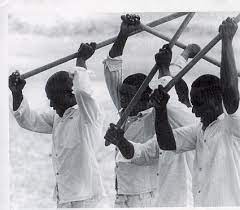Slavery work songs
By: Amaya Thompson
Arwhoolie
Workers in southern cornfields and cotton fields would often relieve boredom by singing a “arwhoolie,” or “Cornfield Holler,” a mournful song with only a few syllables sung by a field worker. A slave or sharecropper in one field could occasionally hear a neighbor’s arwhoolie on the breeze and respond with his own.
Quittin’ time song
Slaves are generally expected to sing as well as to work. A silent slave is not liked by masters or overseers. The masters made slaves sing so that they always knew what the slave was doing and where they were. This may account for the almost constant singing heard in the southern states. These songs were mainly sung in times of sadness and exhaustion, mainly to keep a slaves mind off of the task at hand.
I Be So Glad… When The Sun Goes Down
Slaves in the fields needed something to do. They were out in the fields from dawn till dusk. The majority of the time, it was scorching, and there were no pauses. Slaves would communicate with one another because they were typically working alone. They’d attempt to keep each other on their toes. Slaves would frequently labor together to transport large loads, thus they would require a means of communication. They’d sing “work songs” to keep themselves awake and engaged, as well as to draw attention to one another. These melodies convey stories of how slaves are feeling at the time. They also share tales from their past.


